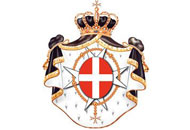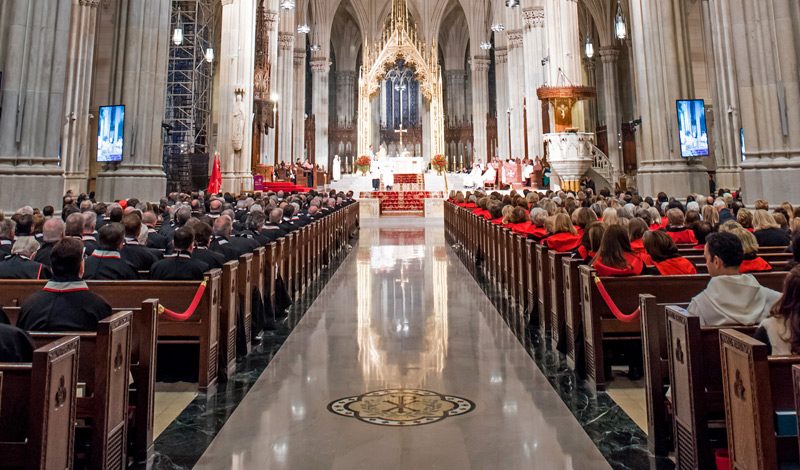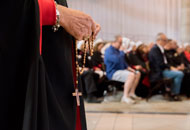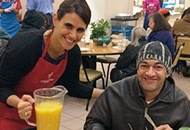Can you give one example in Scripture where God was merciful to a murderer? A Chaplain pulls this question from a basket and reads it out loud to inmates, volunteers and correction officers. He is introducing Jesus’ teachings on the third day of a Kairos prison retreat. Who is this Christ figure? As the Chaplain answers these questions, most everyone in this room behind iron bars and steel doors experiences a sense of being united.
The History of “God’s Special Time”
A three day course in Christianity given in a Florida prison over forty years ago has morphed into Kairos programs involving over 30,000 volunteers serving in 400 correctional institutions. Today they are active in 37 U.S. states and nine countries. Knights in the Order of the Malta’s American and Federal associations, Doug Sandvig (Houston), Mike McGarry (New Hampshire) and Bill Mattison (Florida), among others, participate in Kairos Inside’s nine week mandatory training course every time they volunteer in a four day retreat inside of their area’s prisons.
Combined, Doug, Mike and Bill have been serving through Kairos prison ministry for over three decades. They have also individually signed its statement of faith: Friendship with God is a free gift, for God so loved the world that He gave His one and only son so that whoever believes in Him shall not perish but have eternal life. In the Trinity of the Father, Son and Holy Spirit. In the deity, death and resurrection of Jesus Christ.
Nine old men, as they affectionately called themselves, re designed the Christian method originally named Cursillo to align more closely with the needs of inmates. All of the Kairos prison ministry programs are ecumenical: Inside, for the incarcerated, Outside, for the women whose partners are serving time, and Torch for the young (under 25). The plurality of participation, Doug Sandvig believes, makes it effective.
“All denominations are our brethren here,” he says. Many of the incarcerated with whom Doug ministers have a Catholic background, but often have had negative experiences with the Church which have led to indifference to religion. He sees anger as the better alternative. Opposition against the Church is an opportunity for healing.
The Riverbank
Those who drink of the water that I give them will never be thirsty. John 4:11
The Kairos motto of “Listen, Listen, Love, Love!” is the volunteers’ call to action. During the nine weeks of Kairos training totaling 36 hours, volunteers are expected to read and know the “Manual,” a 334 page instruction book containing information on the history of Kairos, how to get along with the Chaplain and warden, selection process and roles of the core team and leader, the syllabus of the talks during the four day retreat and the instructional and monthly reunion. It also includes how to address issues that the imprisoned face internally and externally. Rigorous structure must remain consistent because, as Mike McGarry points out, they are all guests in the warden’s house. Corrections officers need to know what to expect. “If anything is out of step with the edicts learned during training, one can be sure you will be corrected,” says Bill Mattison, KM, serves in Florida prisons. Bill is also a member of the American Assoc. prison ministry committee and is responsible for Bible distribution in his area.
The Kairos manual stresses a prerequisite of an impactful retreat involving attendance by both “positive and negative leaders.” The prison Chaplain and warden choose which inmates are able to participate – believers and non believers.
“Kairos training is about becoming teachers. The most effective retreats are the ones when we function as a team,” says Mike. Doug and Mike work as weekend leaders in core teams. They were selected by a Kairos advisory council and approved by the State Chapter Committee to plan and prepare every detail. The manual, and all of the well-executed instructional videos available on line reinforce one message: Jesus Christ is the living water and Kairos was created from the well of the living water. The Kairos methodology is also referred to as ‘living within the riverbanks.’ The foundational practices found inside the manual are based on a range of theological and liturgical Christian teachings demonstrating common ground. Its focus remains singularly on Jesus.
Come for the Food, Stay for Healing
What do these old guys want from us? This sentiment is pervasive through prison populations across the country. Kairos’ reputation for offering good food is perhaps the best instrument to initially convince inmates to try and find out what happens during a retreat. Volunteers know this but also learn during training that listening is the most important thing they can do during break out sessions and one-on-one conversations. By this act, they are demonstrating that they don’t want anything from the prisoners, least of all the ability to judge. Asking prisoners why they are serving time is not part of the healing process. In fact, says Mike, it doesn’t matter as it relates to the work Kairos volunteers are meant to do.
The manual outlines the retreat. During its first day, prisoners are made to feel accepted, safe and secure through volunteers’ active listening. On the second day, inmates begin to examine their choices. “It is a stimulating process. The incarcerated are not cowed and are capable of looking inward and realizing that there are no victimless crimes,” Doug says. Finally, on the third day, all those participating are helped to acknowledge the love of Christ. Doug continues, “It gets very emotional. The whole team gets united.” At once or perhaps like light dawning slowly, there is witness of prisoners’ forgiving themselves and those who did them grave harm. This moment of mercy can be triggered by acknowledging serious acts of violence and untold trauma. From there, Doug believes, seeking of forgiveness from others can begin; and from repentance, hope.
Part I of II. Please click here to contact Mary Jo Kriz, co-chair of the American Association Prison Ministry Committee. Click here for more information regarding Prison Ministry.
Article written by PMC volunteer, Alexandra Lehmann




